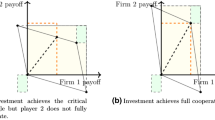Abstract
In this paper we investigate the effect of mediated partnerships over agents’ equilibrium strategies in two-sided economic search. A mediated partnership is formed when an agent acts as a mediator, establishing a partnership between a pair of agents it encountered along its search, thereby reducing the other agents’ amount of search. Surprisingly, this reduction in market friction induced by mediated partnerships does not always improve market efficiency. Use of mediated partnerships changes the equilibrium strategies used by agents in two-sided search models and introduces substantial computational complexity. This computational complexity is overcome with an innovative algorithm that facilitates equilibrium calculation.
Access this chapter
Tax calculation will be finalised at checkout
Purchases are for personal use only
Preview
Unable to display preview. Download preview PDF.
Similar content being viewed by others
References
Atakan, A.E.: Assortative matching with explicit search costs. Econometrica 74(3), 667–680 (2006)
Becker, G.: A theory of marriage. Journal of Political Economy 81, 813–846 (1973)
Bloch, F., Ryder, H.: Two-sided search, marriages, and matchmakers. International Economic Review 41, 93–115 (2000)
Burdett, K., Coles, M.G.: Marriage and class. The Quarterly Journal of Economics 112(1), 141–168 (1997)
Burdett, K., Wright, R.: Two-sided search with nontransferable utility. Review of Economic Dynamics 1(1), 220–245 (1998)
Chade, H.: Two-sided search and perfect segregation with fixed search costs. Mathematical Social Sciences 42(1), 31–51 (2001)
Decker, K., Sycara, K., Williamson, M.: Middle-agents for the internet. In: Proc. of IJCAI (1997)
Hendrix, P., Grosz, B.: Reputation in the venture games. In: National Conference on Artificial Intelligence, AAAI, Vancouver, Canada (2007)
Huynh, T.D., Jennings, N., Shadbolt, N.: Fire: An integrated trust and reputation model for open multi-agent systems. In: Proceeding of 16th European Conference on Artificial Intelligence, pp. 18–22 (2004)
Morgan, P.: A model of search, coordination, and market segmentation. SUNY Buffalo, mimeo (1995)
Pujol, M., Sanguesa, R., Delgado, J.: Extracting reputation in multi agent systems by means of social network topology. In: Proceedings of the First International Joint Conference on Autonomous Agents and Multiagent sytems: Part 1, pp. 467–474 (2002)
Sabater, J., Sierra, C.: Reputation and social network analysis in multi-agent systems. In: Proceedings of the First International Joint Conference on Autonomous Agents and Multiagent Systems: Part 1, pp. 475–482 (2002)
Sarne, D., Kraus, S.: Time-variant distributed agent matching applications. In: Proceedings of AAMAS-2004, pp. 168–175. NY (2004)
Sen, S., Biswas, A., Debnath, S.: Believing others: Pros and cons. In: ICMAS-2000. Proceedings of the Fourth International Conference on MultiAgent Systems, p. 279 (2000)
Sen, S., Dutta, P.: Searching for optimal coalition structures. In: Proceedings of the Fourth International Conference on Multiagent Systems, July 2000, pp. 286–292 (2000)
Shehory, O., Kraus, S.: Methods for task allocation via agent coalition formation. Artificial Intelligence Journal 101(1-2), 165–200 (1998)
Shimer, R., Smith, L.: Assortative matching and search. Econometrica 68(2), 343–370 (2000)
Stewart, I.: Tales of a neglected number. Scientific American 274(6), 102–103 (1996)
Teacy, W., Patel, J., Jennings, N., Luck, M.: Co** with inaccurate reputation sources: Experimental analysis of a probabilistic trust model. In: Proceedings of Fourth International Joint Conference of Autonomous Agents and Multiagent Systems, pp. 997–1004 (2005)
Tsvetovat, N., Sycara, K., Chen, Y., Ying, J.: Customer coalitions in electronic markets. In: Dignum, F.P.M., Cortés, U. (eds.) AMEC III. LNCS (LNAI), vol. 2003, pp. 121–138. Springer, Heidelberg (2001)
Yamamoto, J., Sycara, K.: A stable and efficient buyer coalition formation scheme for e-marketplaces. In: Proceedings of the Fifth International Conference on Autonomous Agents, Montreal, Canada, pp. 576–583 (2001)
Zacharia, G., Maes, P.: Trust management through reputation mechanisms. Applied Artificial Intelligence 14, 881–907 (2000)
Author information
Authors and Affiliations
Editor information
Rights and permissions
Copyright information
© 2007 Springer-Verlag Berlin Heidelberg
About this paper
Cite this paper
Hendrix, P., Sarne, D. (2007). The Effect of Mediated Partnerships in Two-Sided Economic Search. In: Klusch, M., Hindriks, K.V., Papazoglou, M.P., Sterling, L. (eds) Cooperative Information Agents XI. CIA 2007. Lecture Notes in Computer Science(), vol 4676. Springer, Berlin, Heidelberg. https://doi.org/10.1007/978-3-540-75119-9_16
Download citation
DOI: https://doi.org/10.1007/978-3-540-75119-9_16
Publisher Name: Springer, Berlin, Heidelberg
Print ISBN: 978-3-540-75118-2
Online ISBN: 978-3-540-75119-9
eBook Packages: Computer ScienceComputer Science (R0)




